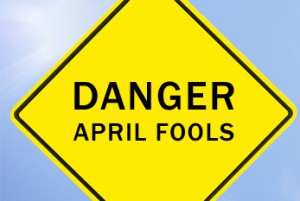On April first, some knuckle-headed media-type loses his or her job broadcasting an April Fools news story. You never know when. You never know where. But at some point today or tomorrow, news will break about an April Fools joke gone wrong and the subsequent firing. The corporate suit or local GM will get to pontificate about the station’s values and offer up the offender’s head in public, but I think this annual rite is really evidence of a deeper problem. 
The deeper problem is that there is a certain cohort of media types who think their newscast is a “show” or a “video production” of some kind. They don’t see it as something unique among video or audio productions. They see it as just another TV show – a piece of entertainment in which they get a chance to “star” and wear a “costume.” The focus is on makeup and fashion, and the excitement of it comes from the lights, camera and a microphone.
Now I know there is plenty of criticism out there about the descent of electronic journalism into the world of infotainment. But that’s no excuse. Treating your radio or TV station’s newscast as a “show” instantly reveals you as a dilettante.
Is this a little old-school? I suppose so.
Does this mean you can never bring a smile to a viewer’s face, crack a joke or do a light feature? Of course not. It means however that you are aware of your responsibility in both good times and bad, and that ultimately, when the you-know-what hits the fan – your body of work suggests you and the station for which you toil, are worthy of turning to. You understand that the show-biz elements of what you do are simply the tools required to tell a story, inform, explain, enlighten, educate, stimulate, aggravate or investigate.
Finally, this brings me to the disturbing and ongoing practice of journalists playing journalists on TV shows or in movies. As one example of hundreds, it appears the entire editorial staff of CNN was co-opted by the producers of House of Cards – reading false news stories on false TVs in a false tale about a false politician. Really?
I have learned over the years that I am virtually alone in insisting that this is unethical. My view is that using your status as a (hopefully) trusted journalist to lend credibility to an entertainment-based TV “show” is right on par with falling prey to using your medium to play an April Fools prank. It is amateurish, and an indicator that your are more about being on TV and the status associated with it than you are the mission you’re supposed to be fulfilling.
So enjoy April first. Play a prank on a friend or a co-worker.
Please just don’t do it anywhere near a mic or a camera if your job description has anything to do with reporting the news on TV or radio.









